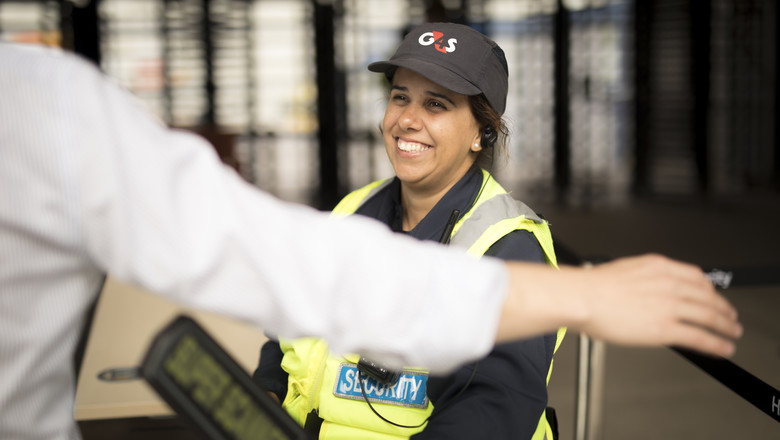
Security Officers: Far
from a normal career

But now, the answer to those very same questions is far less straightforward. Put simply, security officers can now do so much more, and be so much more, than their predecessors, and they have a wealth of gadgetry to do it with.
Security is now far from a one-size-fits-all career, and that’s even more true for the guarding services that can be provided to clients.
G4S, now part of Allied Universal, is 800,000 dedicated security professionals all over the world, protecting sites of all shapes and sizes, in all types of terrains and conditions - each one of them specially trained for their unique posting.
People will always be the beating heart of security guarding services; whether on location, monitoring remotely, or in specialist centres designing the future security tech that continues to grow and impress year on year.
In my view; with these developments, alongside advances in training and health and safety, including mental health care, the role and scope of a security officer has evolved more in the last 10 years than it had in the previous 100 years. With that, the definition of “guarding services” has changed dramatically.
ENHANCED SECURITY OFFICERS
Of course, for many sites and events a more traditional form of security remains the most appropriate solution. It’s not always proportionate, in terms of cost to the client or risk prevention, to roll out the latest tech and elite training for every site and situation. However, even in those circumstances - in retail or corporate reception areas for example - our security officers are now often part of the customer service experience; trained to engage with customers and support them, rather than stand quietly in the background.
When a higher standard of security is necessary, what we can now do - and what a security officer can be - is quite remarkable.
For one of the best examples of this in the entire world, you need look no further than the Hinkley Point C Nuclear Power Station in Somerset, UK.
At Hinkley, the role of our team goes so far beyond the conventional view of what a security officer is and what they do, that we call them Enhanced Security Officers (ESOs). It’s about knowing when that higher standard is needed, and recognising that for a nationally significant project, with an evolving perimeter and thousands of people on site each day, posting guards along the fence is not enough.
ESOs are some of the most well-trained and well-equipped security professionals in the world. They are an absolute game changer in guarding services. The site is the size of a small town, and on top of their intense training in areas such as incident management, physical intervention, trespass and protest scenario skills, they learn a wide range of additional skills, including how to manage crime scenes and preserve evidence. They leave training with a level three City & Guilds qualification, as well as accreditation in emergency first aid and physical intervention.
The ESOs are part of a broader integrated security solution developed by G4S in partnership with EDF.
In a building near the centre of the 430-acre site, operators sit in the security control room monitoring hundreds of remotely operated cameras and an advanced perimeter detection system. They are in constant communication with the mobile patrol ESOs, officers on the entrance turnstiles, those on the eastern and western ends of the 13.5 metre-high sea wall and the officers at a purpose-built jetty.
IMPRESSIVE TECHNOLOGY
They are backed up by some impressive surveillance technology, including remotely controlled CCTV and body worn cameras. The CCTV that we have across the site - fitted with night vision, thermal imaging and motion sensors - provides clear, high definition footage, which allows for much quicker and more accurate analysis of threats. From the control room our operators can proactively deter threats by utilising the speakers and spotlights fitted to the cameras.
Our teams at Hinkley can carry out a wide variety of roles to protect the site. They could be a skilled control room operator, monitoring surveillance footage in real time and using analytics to identify unusual activity and coordinate an appropriate response. Or, they could be a canine specialist, forming a special bond with their highly trained companion.
With a sense of smell somewhere between 10,000 and 100,000 times more acute than a human’s, our canines are very adept at detecting whether something is on the site that shouldn’t be there, and their G4S handlers get qualified to the highest National Association of Specialist Dog Users (NASDU) requirements.
Inevitably, as with almost every location around the world, the COVID-19 pandemic impacted operations at the Hinkley Point C site. But, critical national infrastructure is exactly that; critical. So, it was essential that the thousands of people working at the site every day were able to continue to do so safely.
FOCUS ON MENTAL HEALTH
One in three people in the UK experience mental health problems, and you can be certain that a proportion of the thousands of security officers in the country are counted among them. As with many people who struggle with their mental health, their job may or may not be a factor, but it is certainly true that working in security can be stressful for some, and many will witness distressing incidents from time to time that can be difficult to process.
We now have a number of trained Mental Health First Aiders working at G4S sites in the UK, and this is something we are rolling out even further. These important team members are not counsellors, but they are trained to spot the signs of mental ill-health and approach an individual sensitively in order to support them in an appropriate way.
Importantly, this doesn’t just mean their direct security colleagues. Our teams often work in close proximity to the workforce of our clients, and our security officers who are trained as Mental Health First Aiders are also vigilant to signs of mental distress in the client’s workforce and can approach people and offer support in the same way.
Guarding services have always been about protection, safety and welfare - but that has been largely, perhaps entirely, defined by what can be seen and touched. When you consider that an astonishing 70 million work days are lost each year due to mental health problems in England, our view is that guarding services can play a critical role in identifying individuals displaying the early signs of mental health distress, offer them support, and in some instances this could prevent a security incident occurring. With our Mental Health First Aiders, that’s what we are now doing.
In truth, I’ve barely scratched the surface here of what our hugely impressive security teams are doing every day across the UK, from guarding services at large sporting and music events to massive critical infrastructure projects like Hinkley Point C - but I’m sure you’ll agree that they are a world away from the security officers of years gone by.
If advances over the next decade happen at the same rate as the last, then we have a lot to look forward to.
Noah Price retired as a Major in the British Army in 2007, having served in the Brigade of Gurkhas and in the Army Air Corps. He has been with G4S ever since as the Director of Gurkha Services up to 2015, Head of Solution Design from 2016 to 2019 and now as Head of the G4S Academy for the UK and Ireland.
